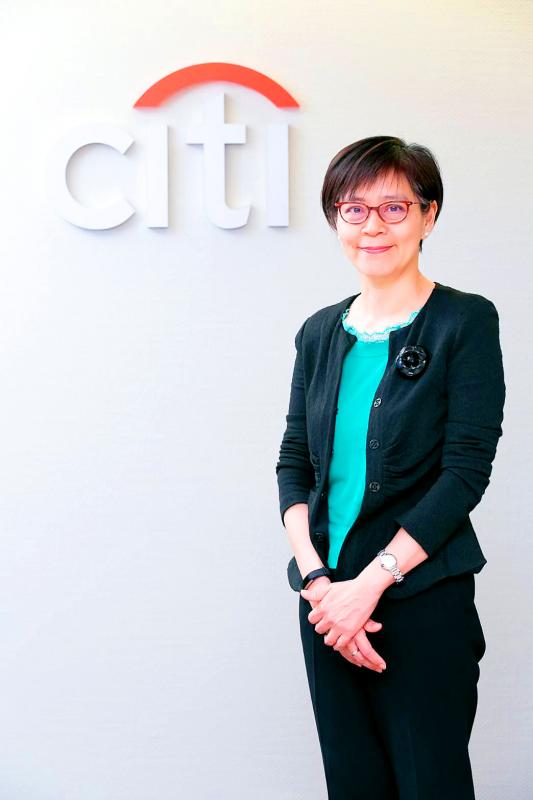Clients of Citibank Taiwan Ltd (台灣花旗) have had one of their busiest years, as the bank’s institutional businesses supported them across capital raising, merger and acquisitions (M&As) and trade, among other areas.
Citi remains optimistic that clients would continue to drive growth across its institutional franchise, given the momentum and aspirations of local companies.
Over the past couple of years, Citi has been an adviser on five Taiwan-related M&As, which included industries such as technology, retail sales, renewable energy and financial services. The transactions were transformational, making the companies global leaders in their industries.

Photo courtesy of Citibank Taiwan Ltd
This year, Citi has used pre-initial public offering placements, block trades, convertible and exchangeable bonds, and US dollar bond issuances to raise billions of dollars across the local and global capital markets for Taiwanese corporations.
“Taiwan is home to many world-class companies and we are committed to supporting their ambitions. There is a massive transformation happening across all industries and with a global network, this has helped sharpen Citi’s dialogue with clients in Taiwan, as they increasingly want a regional and global perspective,” said Christie Chang (張聖心), head of banking, capital markets and advisory at Citibank Taiwan and chair of Asia-Pacific Corporate Banking.
Citibank Taiwan has seen solid growth in its local corporate banking business as it supports the domestic and international banking needs of companies, whose supply chains are evolving further.
The bank’s local and regional networks connect Taiwanese corporations to the rest of Asia, while Citigroup connects them to a global network of 160 markets.
Some of the bank’s inflows that have grown the most this year have been across trade corridors involving Taiwan.
This year, outflows from Taiwan to India have increased nearly 50 percent, while outflows from Taiwan to ASEAN members have risen about 20 percent, as firms continue to diversify their supply chains.
The bank has also seen steady growth in inflows to Taiwan, too, most notably from companies in Australia, India and Japan.

Taiwan Semiconductor Manufacturing Co (TSMC, 台積電) last week recorded an increase in the number of shareholders to the highest in almost eight months, despite its share price falling 3.38 percent from the previous week, Taiwan Stock Exchange data released on Saturday showed. As of Friday, TSMC had 1.88 million shareholders, the most since the week of April 25 and an increase of 31,870 from the previous week, the data showed. The number of shareholders jumped despite a drop of NT$50 (US$1.59), or 3.38 percent, in TSMC’s share price from a week earlier to NT$1,430, as investors took profits from their earlier gains

In a high-security Shenzhen laboratory, Chinese scientists have built what Washington has spent years trying to prevent: a prototype of a machine capable of producing the cutting-edge semiconductor chips that power artificial intelligence (AI), smartphones and weapons central to Western military dominance, Reuters has learned. Completed early this year and undergoing testing, the prototype fills nearly an entire factory floor. It was built by a team of former engineers from Dutch semiconductor giant ASML who reverse-engineered the company’s extreme ultraviolet lithography (EUV) machines, according to two people with knowledge of the project. EUV machines sit at the heart of a technological Cold

Taiwan’s long-term economic competitiveness will hinge not only on national champions like Taiwan Semiconductor Manufacturing Co. (TSMC, 台積電) but also on the widespread adoption of artificial intelligence (AI) and other emerging technologies, a US-based scholar has said. At a lecture in Taipei on Tuesday, Jeffrey Ding, assistant professor of political science at the George Washington University and author of "Technology and the Rise of Great Powers," argued that historical experience shows that general-purpose technologies (GPTs) — such as electricity, computers and now AI — shape long-term economic advantages through their diffusion across the broader economy. "What really matters is not who pioneers

TAIWAN VALUE CHAIN: Foxtron is to fully own Luxgen following the transaction and it plans to launch a new electric model, the Foxtron Bria, in Taiwan next year Yulon Motor Co (裕隆汽車) yesterday said that its board of directors approved the disposal of its electric vehicle (EV) unit, Luxgen Motor Co (納智捷汽車), to Foxtron Vehicle Technologies Co (鴻華先進) for NT$787.6 million (US$24.98 million). Foxtron, a half-half joint venture between Yulon affiliate Hua-Chuang Automobile Information Technical Center Co (華創車電) and Hon Hai Precision Industry Co (鴻海精密), expects to wrap up the deal in the first quarter of next year. Foxtron would fully own Luxgen following the transaction, including five car distributing companies, outlets and all employees. The deal is subject to the approval of the Fair Trade Commission, Foxtron said. “Foxtron will be